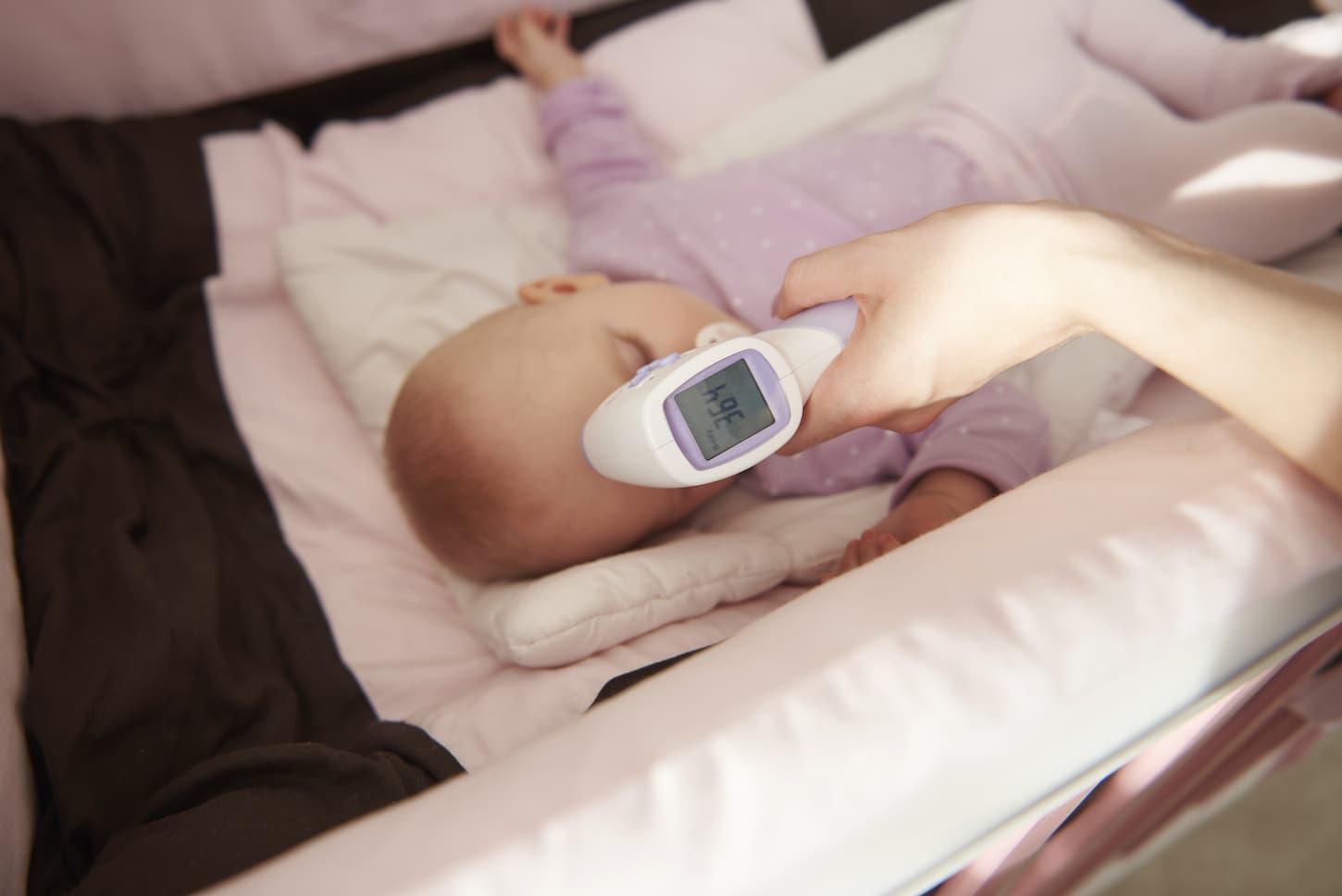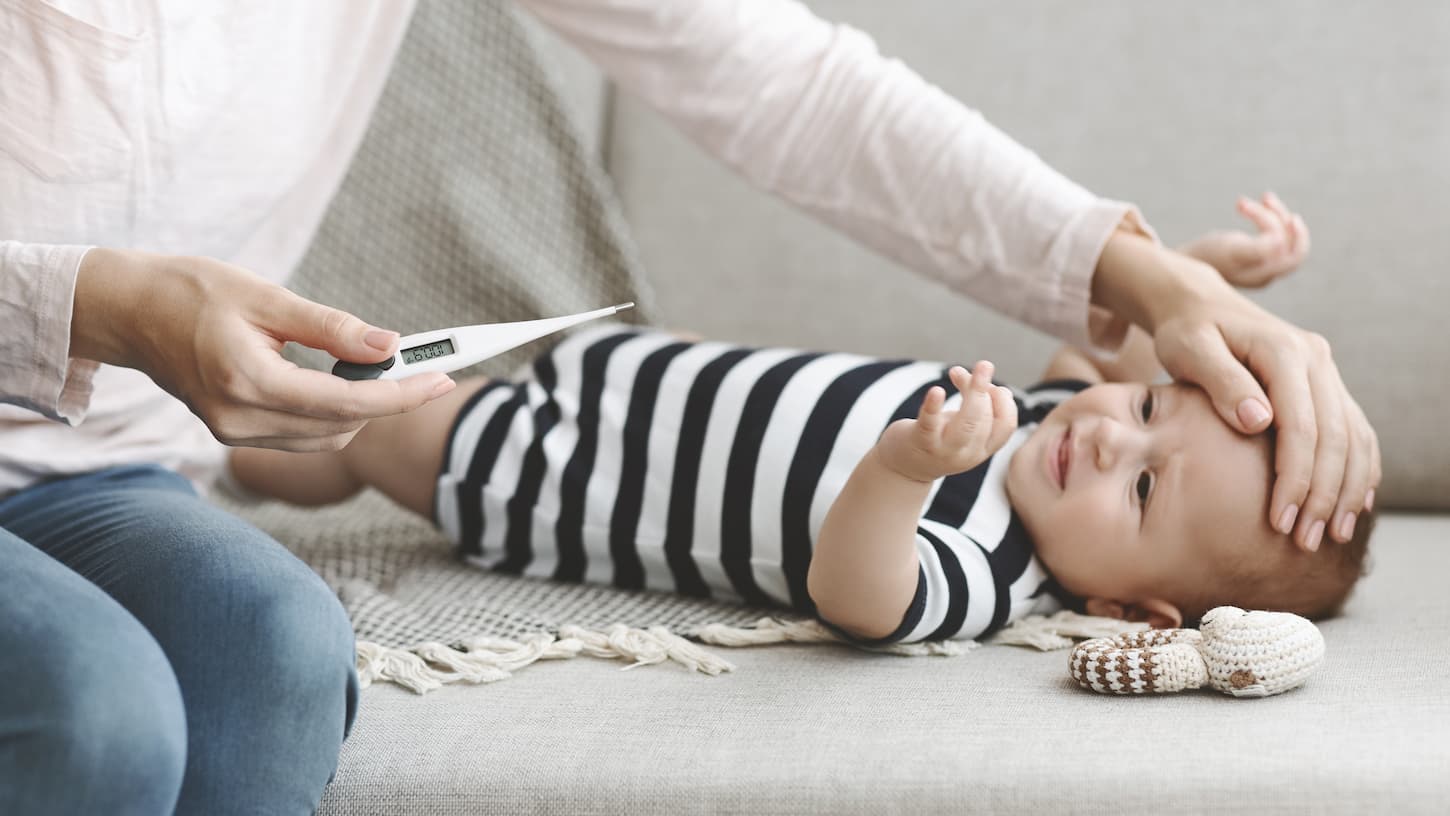You have just sleep-trained your baby. They have a consistent sleep schedule which gives you a bit more time for yourself, you are well-rested, or at least a bit more rested than before. However, the child gets sick. Apart from obvious worry for your child, you are not sure about what to do with their sleep schedule. Do you let them sleep for the whole day? Or do you try to maintain the same sleep schedule you have worked so hard on by any means?
Sick babies generally sleep a few extra hours, but not all day. Sick babies need extra sleep in order to recover from their illness, as long as they’re still able to eat, drink, and interact – even if it’s on a more subdued level than normal. Sick babies should always be under the care of a doctor.
I know that there is a lot of stress involved when there is any change in your baby’s behavior and routine. However, it doesn’t have to be that way in this case. Let’s focus on helping your sick baby for now. We can always return to sleep training when they’re feeling better.

Sick Babies Should Sleep, Eat, Drink, and Interact
In general, sick babies should act like a quieter version of themselves, but they should still eat, drink, sleep, and interact with people. All of their daily activities will be quieter and more subdued than usual – this is normal for anyone who’s sick.
A sick baby may sleep more than normal – by up to a few hours. They generally won’t sleep all day, though.
While working at the hospital, here’s the rule of thumb we taught parents. Sick babies will act like quieter versions of themselves. They should always be wake-up-able. If they aren’t wake-up-able, please seek emergency medical care.
How Much Should a Sick Baby Sleep?
In general, sick babies and children sleep for an extra few hours each day. The extra time spent sleeping may vary from 30 minutes to an extra 3-4 hours, depending on the child, the illness, and how overtired the child is. Sick kids may also sleep less than usual if they are too uncomfortable to sleep.
It’s almost unavoidable for a baby to get sick from time to time. Allergies, flu season, cold, or bad reaction to newly-introduced foods are just some of the reasons your baby may get sick. Please consult your pediatrician or a family doctor any time you’re worried about your child being ill.
Once you have done that, you can start taking care of your baby by following the medical advice that you are given. It’s inevitable that you will see changes in your baby’s behavior or routine once they are sick. They may eat less, cry more, or feel more tired, which may result in them needing to sleep more.
You know your baby the best and therefore, you know what habits are unusual or out of the ordinary for them. Trust the signs that your baby is displaying. If one of those signs is the increased amount of sleep they get, you should trust them that they actually need it, and let them get the sleep they need. Sleep is a very important tool for getting better.
Sleeping lets the babies rest and helps the immune system use the energy they would otherwise use for some other activity to heal the body and fight off the disease. By letting your baby sleep as much as they need, you are providing them with one of the key means for them to get better.
One more important thing to notice is that they may not be able to fall asleep at any time of the day or night. If they are sick, they probably exhibit symptoms that would make it difficult for them to sleep. For example, tummy aches, stuffy nose, itchy skin, or diarrhea are just some of the unpleasant reactions that could disrupt their sleeping schedule.
In such times, they need care and attention to help them be comfortable. They may even need some medicine to feel well enough to sleep. You can ask your doctor for appropriate medications to give your child.
Make sure they get better and let them see that you are here and care for them. When the symptom goes away or gets milder, they will be able to fall asleep and probably sleep more to compensate for the time they couldn’t because of the pain.
Remember that the only thing you should worry about in these times is your baby’s well-being. Depending on what symptoms they have and how are they feeling, you should make sure to give them extra care. Rub their tummies or feet, massage their body, give them a nice warm bath, and hold them more often.
If your baby usually sleeps alone, you may want to reconsider that and join them in their room for a few nights until they get better. It will make them feel safer that you are there to help them if they start crying or experiencing discomfort. Just be sure to sleep safely.
How Much Sleep is Too Much for a Sick Baby?
Generally speaking, there isn’t such thing as “too much sleep” for a sick child unless they reach a point where they cannot be woken up or they are exhibiting other concerning signs or symptoms. In those cases, always seek emergency medical care from your pediatrician or physician.
Depending on the established routine, there are a few instances when you should wake your baby up from a nap, even when they are sick. First of all, newborns who are breastfed shouldn’t go more than two to four hours without food. Babies who are getting formula shouldn’t go more than three to four hours without being fed.
When the baby is sick, it’s okay to let them sleep for a few hours and disrupt the feeding schedule a bit, but if the baby naps for more than three or four hours it’s good to wake them up to check on them and give them the nutrients and liquids necessary for getting better.
When the baby is vomiting or has diarrhea, it’s especially important for them to eat and replenish the liquids they are losing.
If you notice that your baby sleeps too much, you should always consult your healthcare provider on what to do. It may be just because they are getting the needed rest so they can heal, but if it is more than 16 or 17 hours per day, then it’s definitely good to at least touch base with your baby’s doctor. That way, they’ll know what’s going on and can help you track the symptoms.
When my kids have been ill, they’ve slept as long as 18 hours in a day without it being a concern – but they never reached the stage of not being wake-up-able. That’s the stage where you definitely need medical help – and you need it sooner than later.
What About Sleep Training a Sick Baby?
Sleep training a sick baby generally doesn’t work. Wait until a baby is healthy before trying to do dedicated sleep training. Sick babies can still see a benefit from a general schedule and bedtimes, but they need all the rest they can get, even if the usual schedule isn’t kept.
In my experience as both a registered nurse and a mom, I’ve not found a single case of successful sleep training with a sick child. Most every sick child sees a regression in their sleep behaviors while ill. That’s normal and fine. Focus on getting better. You can sleep train your child when everyone’s feeling better.
What About the Sleep Training When the Baby Gets Better?
Once a baby is better after having been ill, sleep training is totally doable. Use an age-appropriate method that appeals to your parenting preferences, styles, and techniques. Follow the methodology for at least 2 weeks before changing anything or trying something new.
First of all, make sure that your baby is definitely and completely healed. There must be no more symptoms and ideally, the doctor will have signed off – saying there is nothing to worry about anymore!
Now, how do you get them back to the sleeping schedule they already had? It might take several days, but it will be easier and less stressful than before. Remember that you are not teaching them how and when to sleep again, you are just reintroducing the same thing they once learned.
It’s like anything else that we do, really. If you learn how to play a song on the piano and then you don’t play it for a month or two, then you might need a few extra minutes of practicing. But you will remember how to play it soon!
Sleep training can be like that. Get back to the same method that you used before your baby was sick and stick to it. They may exhibit some resistance (because you spoiled them a bit in the past few days while they were ill – but that’s normal). But soon enough, they will be back on track and on the track to a full night’s sleep.
That being said, prioritize the well-being of your child! Sometimes prioritizing your child will mean consistent sleep training and maintaining their sleep schedule. In the times when a child is sick, the priority is for them to get better, even if the sleep training is disrupted.
As you will see, it won’t be that difficult to get your child back on track and establish a regular sleep schedule again. One more thing is to take care of yourself too! It can be tiring and stressful to take care of a sick child, so try to take some time for yourself too. Happy mama, happy child!

Key Takeaways on Letting Sick Babies Sleep
It’s hard when your little one just wants to sleep. But when they’re sick? They need that extra rest. It’s like if you got sick – you’d probably want a nap, too. That extra rest will help you recover faster. So let sick baby sleep.
As long as they’re wake-up-able, eating and drinking enough to keep peeing, and a quieter version of themselves, then the nurse in me doesn’t worry too much. But always listen to your gut instincts, because you know your child better than I do. So if your instinct says to get help, please seek help.
My kids, definitely need more rest when they’re ill – and that’s been true ever since they were babies. My kids generally slept anywhere from an extra 30 minutes per day to a whopping extra 4 hours per day. It’s varied from one illness to another – and from one child to another. I haven’t found a rhyme or reason to it so far, but I’ll keep looking. 🙂
In any case, sicknesses happen. Seek help when you need it or something feels off. And make sure you create a healthy sleeping environment so your family can get feeling better faster – and get back on the road to sleeping well, too.
I wish you the best of luck – and that the illness doesn’t trigger a sleep regression early or late – so make sure you give that article a read next.